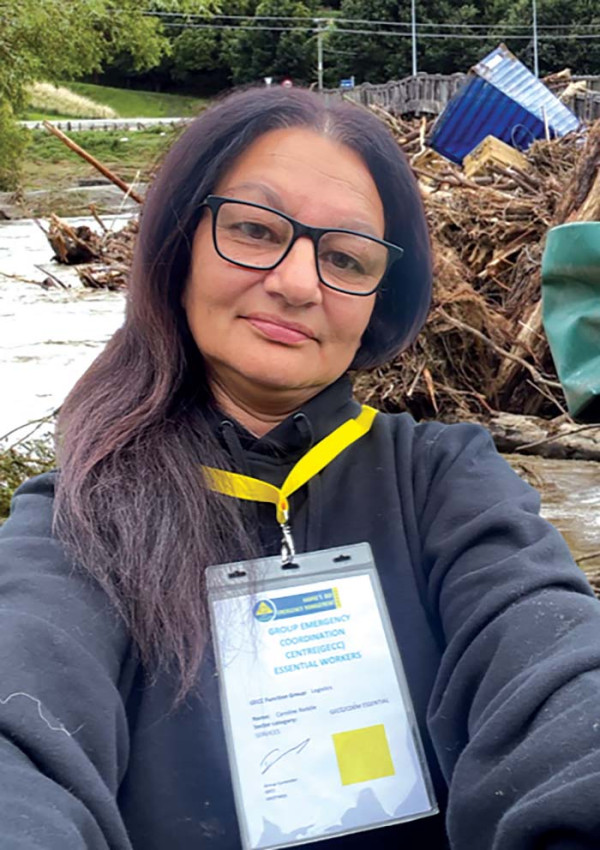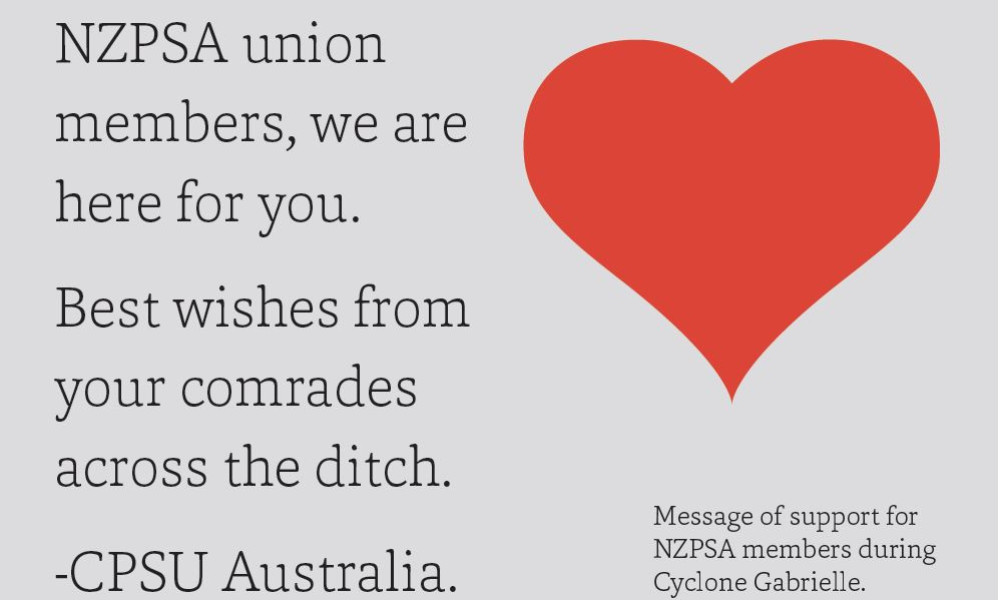When Cyclone Gabrielle arrived in Hawke’s Bay, PSA member and Waka Kotahi auditor Caroline Reddie
found her home without power or connection to the outside for five days. On the 17th, when with the help of a generator she got connected to the internet via Starlink, she realised the extent of the damage and immediately answered the call to volunteer alongside dozens of other public servants.
“At the Civil Defence headquarters, my primary role was to source anything and everything requested,” Caroline told Te Mahinga Ora, “from food supplies for cut off communities, to medicine for patients, to torches for the army so helicopter operators could see better at night when doing heli-drops.”

With experts from the National Emergency Management Agency flown in from around the country, local public servants like Caroline provided the on-the-ground local knowledge that ensured the cyclone response would have the strongest impact on those in need of assistance.
As a local, Caroline made a special effort to procure from local suppliers wherever possible, to help keep money flowing into the Hawke’s Bay economy. One example of this was connecting with a Wairoa whiteware
store to procure a new washing machine for a local marae, where many evacuees were staying and had overwhelmed the old machine there.
From local to national
Meanwhile, in Wellington, PSA National delegate Rose Mareko had also answered the call. Several
weeks earlier, Rose had jumped at the chance to support Aucklanders affected by flooding to find new homes through MBIE’s Temporary Accommodation Service, and when asked if she’d extend her secondment to provide the same support to the regions hit by Gabrielle, she immediately said yes.
“At the moment the people we’ve supported into temporary accommodation are almost all still there – they won’t be back into their homes probably until next year,” Rose said. “So we still do regular case management with them, check on how they’re going. They want to know we haven’t forgotten them, so regular contact is critical.”
Rose is Samoan, which meant that she was often asked to work with Pacific families in particular, including some who felt more comfortable speaking Samoan than English. But it wasn’t just the language barrier where Rose was able to provide extra support. “Speaking Samoan definitely helped put people at ease, but it’s not just the language – it’s understanding the family dynamics, who’s living with who, the different roles people
play in Pacific families and how that might change their housing needs.”
Communities caring for each other
For Tamara Baddeley, a home support worker in Napier, she found that for some of her regular elderly
clients she became their only link to the outside world.
“I saw all of my clients every day – even doing visits when I wasn’t rostered on – and called them to
do welfare checks and make sure they were doing ok physically and mentally.”
Going above and beyond seemed like the right thing to do to Tamara, who said that “just by being there
I was able to give their whānau reassurance that their loved ones were still being cared for in difficult times.”
With power still out and news from the outside world hard to come by, Tamara would sometimes bring
her clients out to her car so they could listen to the news on the radio and hear the latest about what was happening.
She also saw signs of communities coming together to look after each other – some of her clients only
had electric cooking facilities, but neighbours banded together to bring hot meals to them which they
otherwise wouldn’t have been able to have.
It’s these strong collective values that come second nature to union members, and Hastings librarian
Fiona Frost saw them every day. As the library was initially closed in the immediate aftermath of Gabrielle,
Fiona joined other Hastings District Council staff helping to provide for people’s needs.
At times the first person you’d see after being rescued by boat or helicopter, Fiona’s job was to greet you, listen to your story and connect you with the various services depending on your needs – food, accommodation, medicine and more.
“It’s good that we were there,” Fiona noted, “sometimes people just needed to be able to tell their story,
it was needed for them to be able to move forward. Difficult at times for us, talking to people who had lost everything.”
In late March, the library is back open and Fiona is back in her day job, but the impact of Cyclone Gabrielle is still ever present. “Even now people still just come up to the desk and want to talk. We’re happy to listen, that’s just what librarians do. We’re so used to dealing with the public face to face.”
“It is incredible to see what communities have done, not just the official groups doing things, but little communities and neighbourhoods just getting together and doing things that need to be done. Going out to the hubs and seeing what people have done and are continuing to do is amazing,” said Fiona.
The clean-up in all the areas impacted by Cyclone Gabrielle will take a long time, and rebuilding people’s lives perhaps even longer. You can be sure, however, that PSA members from across all parts of our union will be at the centre of this, ensuring that together, we’ll get through.
Asher Wilson-Goldman


